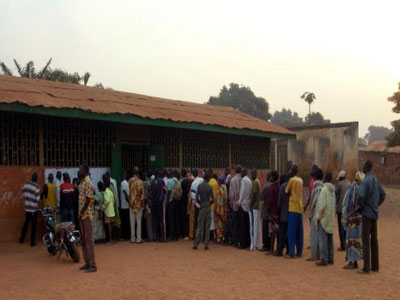 Violence broke out in the Central African Republic capital Bangui Sunday as people voted in a referendum aimed at ending the nation’s bloody sectarian strife.
Violence broke out in the Central African Republic capital Bangui Sunday as people voted in a referendum aimed at ending the nation’s bloody sectarian strife.
Five people were wounded in Bangui’s volatile Muslim-majority PK5 district where clashes broke out between supporters and opponents of the referendum on a new constitution.
Two were seriously wounded, according to a Red Cross employee who said fighting was continuing near the district’s main mosque.
Gunfire and grenade blasts were also heard in the Gobongo district, a stronghold of the Christian “anti-balaka” militia, a security source said.
Voting had yet to begin in the PK5 district, where a UN peacekeeping source said gunfire had erupted overnight.
Authorities were setting up an alternative polling station after the unrest forced the closure of a school where voting had been set to take place.
After more than two years of fighting that forced 10 percent of the population to flee the country, Sunday’s vote on a new constitution is seen as a test run for presidential and parliamentary polls in two weeks.
If adopted, the Central African Republic’s new constitution would usher in the country’s sixth republic since independence from France in 1960 but mark its 13th political regime in as many years.
The constitution would, among other things, ban “all form of religious fundamentalism and intolerance”.
The ballot comes two weeks after Pope Francis appealed to Muslims and Christians in the former French colony to live as “brothers and sisters”.
Despite the presence of 11,000 UN and French peacekeepers, part of the impoverished country remains out of bounds, under the control of either rebel chieftains or bandits.
UN peacekeepers must escort convoys of trucks carrying voting slips that leave every day from Bangui for the interior, given the volatile situation in parts of the country.
The widespread chaos has hampered organisation of the ballot by the country’s interim authorities, with few election posters visible on the streets just 48 hours beforehand.
More significantly, only 15,000 copies of the new constitution have been printed, meaning that few voters are fully aware of its contents.
Almost two million Central Africans have registered to vote in a population of 4.8 million — spurring hopes the election will be the first step in a return to peace and normalcy.
UN chief Ban Ki-moon appealed on the eve of the vote to ensure “that the referendum is conducted in a peaceful and credible manner” and called it a “significant milestone towards the end of the transition in the Central African Republic”.
Many of the 5,600 polling stations are located in remote areas accessible only by dirt roads.
And of the 460,000 people displaced by the unrest living in camps across Central African Republic’s borders — many of them Muslims — only 26 percent have been able to register.
In Bangui, which has been far quieter since the pope’s bold 24-hour visit, peacekeepers are on edge. “Here things can blow up very quickly,” said a security source who declined to be identified.
“The conditions are not right for an election,” said Maxime Mokom, a leader of the anti-balaka militia set up to battle the mainly Muslim Seleka rebel force.
– ‘Make-or-break’ –
However, Mathieu Bile, who heads the UN mission in Central Africa’s election department said the “simple fact that this vote can be held is very positive”.
The country was plunged into its worst crisis since independence after longtime Christian leader Francois Bozize was ousted by rebels from the Seleka force in March 2013, triggering a wave of violence with “anti-balaka” militias.
Senior rebel figure Nourredine Adam has threatened to block elections in areas under his control.
His Patriotic Front for the Renaissance of Central Africa (FPRC), a splinter faction of the former Seleka rebel group that staged a coup in 2013, is staging an armed revolt in northern Kaga Bandoro.
“The elections might be difficult in Kaga Bandoro and one or two other places,” said an EU diplomat, who added however that the stakes would be highest in the country’s most densely populated regions in Bangui and the west.
The international community, which has been pouring aid into the country for over two years, is keen for the referendum as well as the follow-up elections to take place.
“These are make-or-break elections,” said the International Crisis Group’s Thierry Vircoulon.



